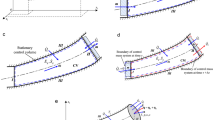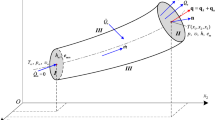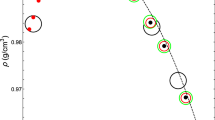Abstract
HEAT transfer may be described by the coefficient α occurring in Newton's law of cooling, the other factors being the surface and the temperature difference. For bodies determined by one dimension, for example, a sphere of diameter D in an infinite fluid of conductivity λ, it is better to use the dimensionless Nusselt number Nu = αD/λ.
This is a preview of subscription content, access via your institution
Access options
Subscribe to this journal
Receive 51 print issues and online access
$199.00 per year
only $3.90 per issue
Buy this article
- Purchase on Springer Link
- Instant access to full article PDF
Prices may be subject to local taxes which are calculated during checkout
Similar content being viewed by others
References
App. Sci. Res. (in the press).
Codegone, C., Acc. Sci. Torino Atti, 75, 167 (1939).
Powell, R. W., Phil. Mag., 29, 274 (1940).
Author information
Authors and Affiliations
Rights and permissions
About this article
Cite this article
DUMORÉ, J., MERK, H. & PRINS, J. Heat Transfer from Water to Ice by Thermal Convection. Nature 172, 460–461 (1953). https://doi.org/10.1038/172460b0
Issue Date:
DOI: https://doi.org/10.1038/172460b0
This article is cited by
-
Effects of water speed and temperature on icing in thermal siphons
Journal of Engineering Physics (1988)
-
Dynamics of the icing-over of low-temperature pipelines in stagnant water
Journal of Engineering Physics (1985)
-
Effect of ice surface orientation on intensity of water-to-ice heat transfer under free convection conditions
Journal of Engineering Physics (1984)
-
Free convective heat transfer with density inversion in a confined rectangular vessel
Wärme- und Stoffübertragung (1978)
-
Influence of natural gas evolution while melting on the separation of the boundary layer
Journal of Engineering Physics (1977)
Comments
By submitting a comment you agree to abide by our Terms and Community Guidelines. If you find something abusive or that does not comply with our terms or guidelines please flag it as inappropriate.



